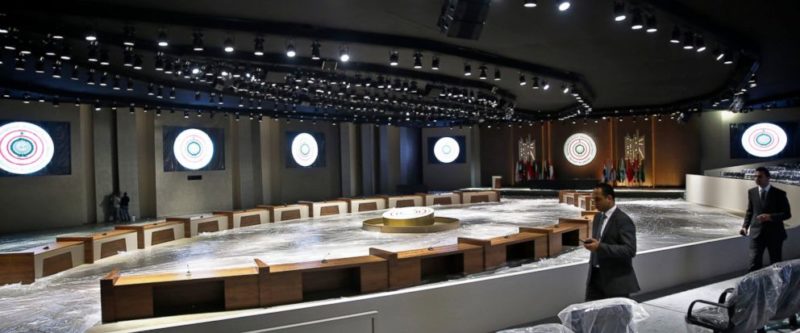
By ZEINA KARAM and BASSEM MROUE Associated Press
An Arab economic development summit that Lebanon is hosting this weekend has been marred by controversy days before delegates arrive.
Should regional outcast Syria be invited, as demanded by Lebanon’s powerful Hezbollah militant group, an ally of Syrian President Bashar Assad? Should Libya get a seat at the table, despite the unresolved mystery surrounding the disappearance of a Lebanese cleric in Libya four decades ago?
And should Lebanon, which has been without a government for more than eight months, even be allowed to host as it stands at the brink of economic collapse?
Yes, according to President Michel Aoun, who is hoping to use the platform to boost Lebanon’s sinking economic credentials. Lebanon’s powerful parliament speaker, Nabih Berri, disagrees, saying a country paralyzed by its own divisions cannot successfully host a meeting of Arab nations.
The turmoil and chaos is nothing new to Lebanon, a tiny country fragmented along political and sectarian fault lines. Even in the best of times, it seems to be permanently on the edge of an impending crisis. Now, as a government vacuum stretches into its ninth month, there are real concerns that the ongoing political impasse will scuttle pledges worth $11 billion by international donors and lead to economic disaster.
On Monday, organizers of the Arab Economic and Social Development Summit, or AESD, held a press conference, announcing summit preparations were in place.
“All practical and logistic preparations for this summit have been completed,” said Rafik Shalala, the summit’s spokesman. Antoine Choucair, a member of the organizing committee, said the event’s cost is estimated at $10 million, paid for by the host country.
The AESD was formed in 2009 as an exclusively economic and development conference that tends to involve the private sector, including banks, chambers of commerce, industry and agriculture. The agenda does not include the reconstruction of Syria, much of it ruined in nearly eight years of civil war.
Choucair said up to six heads of state are expected to attend, although that number will likely be lower.
At the heart of Lebanon’s political deadlock are divisions between its two opposing pro and anti-Syrian camps. The country held parliament elections in May and the Iranian-backed Hezbollah scored significant gains, but politicians have been unable to form government since. And as President Bashar Assad and his ally Iran are largely seen as having won the war in neighboring Syria, there are concerns that Assad’s government is once again trying to reassert its influence in Lebanon.
The question of whether to invite Syria, whose membership in the Arab League was suspended in 2011, quickly became an issue.
Pro-Syrian groups led by Hezbollah have insisted that the Syrian government should be invited.
“In the absence of a government, and because Lebanon should have a uniting, not divisive (Arab) role, and because we don’t want the summit to be a failure, I think it should be postponed,” Parliament Speaker Berri said, according to his Shiite Amal party, adding that he believed that if the summit is held, Syria should be invited.
“It is not Lebanon who issues the invitations, Lebanon abides by the decisions of the Arab League,” Lebanon’s Foreign Minister Gibran Bassil responded in a tweet.
Then last week, a new debate erupted over whether Libya should be invited in a dispute that stems from the 1978 disappearance of Shiite cleric Imam Moussa al-Sadr, founder of the Amal party now headed by Berri. The cleric vanished on an official visit to the country when it was ruled by Moammar Gadhafi. The issue remains a longstanding sore point between the two countries, even though Gadhafi was overthrown and killed in 2011.
Al-Sadr’s family believes he may still be alive in a Libyan prison, although it is widely believed that the cleric, who would be 90 years old today, is dead.
Berri’s Amal group says Libyan authorities have been uncooperative in the case. The party said that Libya’s U.N.-recognized government in Tripoli should not be invited, and its supporters threatened to cut off Beirut’s airport road to prevent the Libyan delegation from reaching the summit venue should they arrive in the country.
On Sunday night, a group of Amal supporters tore down a Libyan flag decked on a Beirut street along with those of other participant nations, and replaced it with the green flag of the Amal party. The Libyan foreign minister reportedly said in an interview with a local channel Sunday night that Libya will cancel its participation in the summit over the insult to the Libyan flag. Shalala, the summit spokesman, said they have not been officially notified of the Libyan decision.
The fracas over a 40-year-old issue has led to accusations that pro-Syrian groups were trying to derail the summit, because of the absence of Syria. Nadim Koteich, a Lebanese political satirist, lamented the political scene whereby a political group’s unilateral decisions are met with silence by the state.
“All Arab countries concerned about Lebanon as a state … should boycott the economic summit and tell their delegations to cancel their travel to the Lebanese jungle, until the restoration of (Lebanese) sovereignty,” he wrote in a Twitter post.
AP

Leave a Reply
You must be logged in to post a comment.